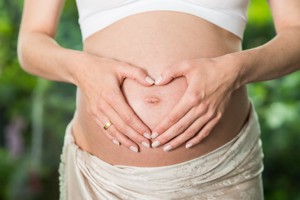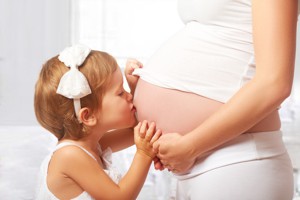 If you are pregnant and are experiencing vaginal bleeding or spotting, then try not to panic. As frightening as it is likely to be for you, there is a good chance that everything will be fine. There are lots of reasons for bleeding and spotting during pregnancy as we outline here. However, it should be noted that any bleeding and spotting should be discussed with your midwife.
If you are pregnant and are experiencing vaginal bleeding or spotting, then try not to panic. As frightening as it is likely to be for you, there is a good chance that everything will be fine. There are lots of reasons for bleeding and spotting during pregnancy as we outline here. However, it should be noted that any bleeding and spotting should be discussed with your midwife.
What Are The Causes Of Spotting and Bleeding During Early Pregnancy?
In early pregnancy, many women experience spotting or light bleeding and then go on to birth a healthy baby. There are a number of reasons for this. In some cases, bleeding may be as a result of implantation, where the fertilised egg attaches itself to the wall of uterus. This usually happens around the same time that you would have expected your first period after conception, and is often mistaken for being so. Other women will have a period as normal, although it may be a bit lighter, as the pregnancy hormones can be slow to effect the body thus halting the normal period process.
Some women may have a more sensitive cervix, and this can cause light bleeding when the area is irritated, i.e. from sex or straining for a bowel movement. Bleeding may also be a sign of infection. Although the sight of blood can be alarming, rest assured that a good proportion of women will not experience any further complications.
Sadly, bleeding in early pregnancy can be a sign of miscarriage or ectopic pregnancy. The majority of miscarriages occur during the first trimester (the first 12 weeks) and the bleeding will be heavier, possibly accompanied with clots and tissue, and there will be stomach cramping. Occasionally, an ectopic pregnancy will occur, where instead of implanting into the womb, the fertilised egg will attach somewhere else, often on one of the fallopian tubes. Whilst some women with ectopic pregnancies will have no symptoms, many will experience extreme cramping, diarrhoea, and vomiting.
When Should I Be Concerned?
It’s best to discuss any bleeding or spotting you experience with a midwife, even if it stops quite quickly. You midwife will be able to reassure you, and if necessary check your cervix for any problems, or listen to your baby’s heartbeat with a foetal Doppler. Light spotting and bleeding during early pregnancy is very common and not necessarily a sign that something is wrong. However, if you are also suffering with diarrhoea, vomiting, severe or persistent abdominal pain, an increased heart rate, or persistent heavy bleeding, then seek medical help immediately.
What Are The Causes Of Bleeding During Later Pregnancy?
 There are some cases of women continuing to have period like bleeding for several months into their pregnancy, although these are quite rare, and thought to be as a result of hormone imbalances. Cervix sensitivity can also continue into late pregnancy and some women will have small amounts of bleeding after sex, however, this is generally harmless for the baby.
There are some cases of women continuing to have period like bleeding for several months into their pregnancy, although these are quite rare, and thought to be as a result of hormone imbalances. Cervix sensitivity can also continue into late pregnancy and some women will have small amounts of bleeding after sex, however, this is generally harmless for the baby.
In the days leading up to labour, you may have a “Show”, where the mucus plug that is at the base of the cervix detaches ready for labour and is discharged from the vagina. This is a lumpy gelatinous substance that frequently has blood streaks through it. This is perfectly normal and a good sign that labour is on its way.
However, bleeding in later pregnancy can also signify something serious. This includes Placental Abruption, where the placenta separates from the womb. Unfortunately, this often leads to the baby being stillborn or being born prematurely. It is often accompanied by severe pain. Bleeding in later pregnancy can also be a sign of Placenta Praevia, or low-lying placenta, where the placenta is low down in the uterus and covers the cervix. This can cause heavy bleeding and both mother and baby may require blood transfusions. Furthermore, as the condition affects the position of the baby, many women with this condition require a caesarean section instead of a vaginal birth.
Again, if you experience bleeding, particularly heavy bleeding accompanied with pain during your pregnancy, you should seek medical help as soon as possible.
